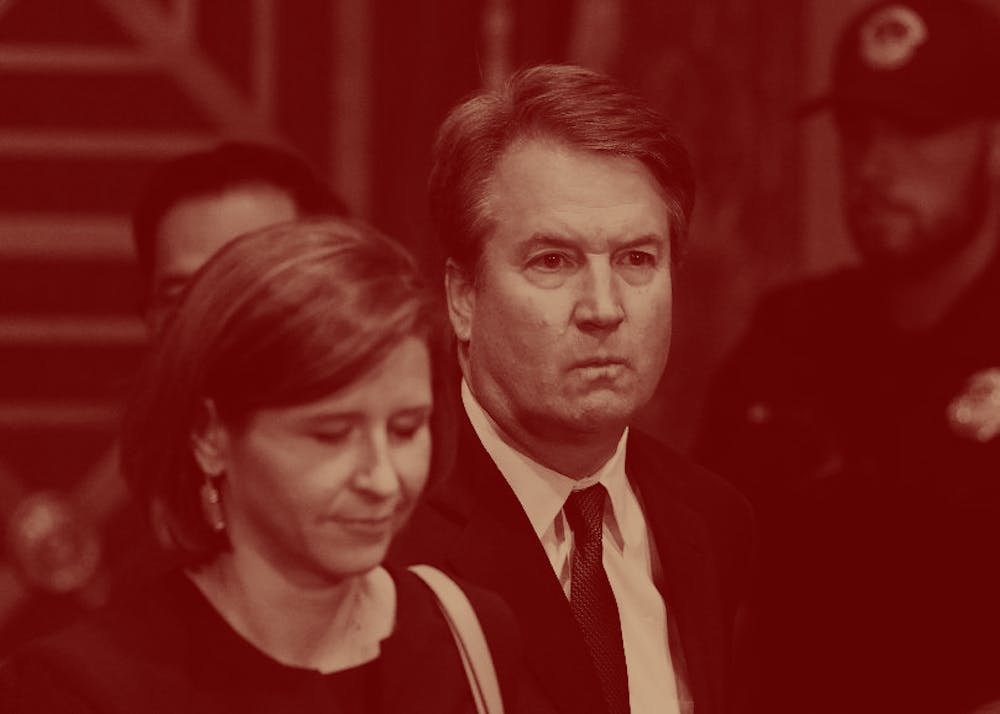
Judge Brett Kavanaugh’s confirmation has put his alma mater, Yale University, in a precarious place. Ordinarily, the addition of a Supreme Court Justice to the pantheon of successful alumni would be cause for celebration. But Kavanaugh’s nomination was opposed by the majority of the country.
The Yale community has been grappling with how to approach alumni that may legitimize or sell the prestige of the university in the face of objections to character. As a result of widespread student activism, Yale has been called “the epicenter of the Kavanaugh resistance.”
In the wake of this self-examination, it is vital that Penn, as a university and as a community, examines those that it puts on a pedestal.
The recent testimony of Dr. Christine Blasey Ford has rightly recalled the 1991 testimony of Anita Hill during Justice Clarence Thomas’s confirmation process. When Hill spoke at Irvine Auditorium, she called the Kavanaugh hearings a “tragedy” and “a disservice to the American public.”
As we continue to discuss Dr. Ford’s Congressional hearing, it is worthwhile to remember former Vice President and Penn professor Joe Biden’s conduct during Hill’s hearing 27 years ago.
Appointed in 2017 as Penn’s inaugural Presidential Professor of Practice, Biden is a now a frequent and beloved visitor to campus as well as an increasingly central part of the University’s brand. As the chair of the Senate Judiciary Committee in 1991, he oversaw hearings where senators asked Hill a series of inappropriate questions. At one point, Sen. Howell Heflin from Alabama asked Hill if she were a “scorned woman,” implying that her decision to testify before Congress was part of a revenge scheme.

While overseeing these proceedings, Biden failed to speak up and criticize his colleagues’ behavior. Biden also did not call on any witnesses who could corroborate Hill’s testimony. While he has since admitted that he owes Hill an apology, she claims that he has never actually done so. In an interview with Elle, Hill said it has become a running joke in her family that any unexpected visitor ringing their doorbell could be Biden coming to apologize. Biden’s more recent support for the It’s On Us campaign to end sexual assault is commendable, but should not erase his inaction during the Hill testimony.
The former VP is not the only Penn figure whose shortcomings ought to be re-examined.
In recent years, Ben Franklin, arguably the most notable person in Penn’s history, has become a topic of moral debate. Last spring, Penn professor Jonathan Zimmerman sparked controversy when he suggested that the inscription on the Benjamin Franklin statue in front of College Hall be amended to read “OWNER OF SLAVES.”
1997 College and Wharton graduate Elon Musk’s recent legal battles with the SEC offers another example. Between attacking journalists and accusing one of the divers who rescued the trapped Thai soccer team of being a pedophile, Musk has also carried himself bizarrely in the public sphere. While he does not have a strong official presence on campus, Musk has served as something of a patron saint of successful entrepreneurship and bold innovation to many at Penn. In 2007, the Wharton alumni magazine praised Musk for his business acumen and humanitarian interests in space exploration and clean energy.

With President Donald Trump, Penn faces a challenge of how to address his alumni status. The administration has been quiet on this front, but the question at hand will not fade after he departs from the Oval Office; in fact, it will become all the more important. Penn finally has a president to count among its alumni, and must decide how it will present his legacy to the generations of Quakers to come.
Ignoring the shortcomings of Penn icons to preserve the pristine image of their character is dishonest and beneath us. As more Quakers continue to make their marks in the world, let us be clear-eyed in evaluating their merits. Acknowledging the fallibility of Penn’s stars, instead of turning a blind eye to the choices of the past, allows us to learn from their mistakes and teaches students to think critically about their own choices.
The Daily Pennsylvanian is an independent, student-run newspaper. Please consider making a donation to support the coverage that shapes the University. Your generosity ensures a future of strong journalism at Penn.
Donate







